“All About Raisins: Types, Benefits, and How to Enjoy Them”

Raisins are dried grapes that have undergone a dehydration process, resulting in a concentrated and nutrient-rich fruit. They are widely popular as a sweet and chewy snack and are used in various cuisines and recipes around the world. Raisins offer a multitude of health benefits and can be enjoyed on their own or incorporated into a wide range of dishes.
Here is a detailed explanation of the various aspects of raisins:
- Nutritional Composition: Raisins are packed with essential nutrients that can contribute to overall health and well-being. They are a rich source of dietary fiber, which aids in digestion and helps maintain bowel regularity. Raisins are also a good source of natural sugars, including fructose and glucose, which provide a quick energy boost. Additionally, they contain various vitamins, such as vitamin C, vitamin K, and B-complex vitamins, including thiamin, riboflavin, niacin, and vitamin B6. Minerals like potassium, calcium, magnesium, iron, and phosphorus are also present in raisins, making them a valuable addition to a balanced diet.
:max_bytes(150000):strip_icc()/raisins_annotated-be292ff867354dfc9a05232476968deb.jpg)
- Health Benefits:
- Digestive Health: The fiber content in raisins promotes healthy digestion, prevents constipation, and supports a healthy gastrointestinal tract.

- Bone Health: Raisins contain calcium and boron, which are essential for maintaining strong bones and preventing conditions like osteoporosis.
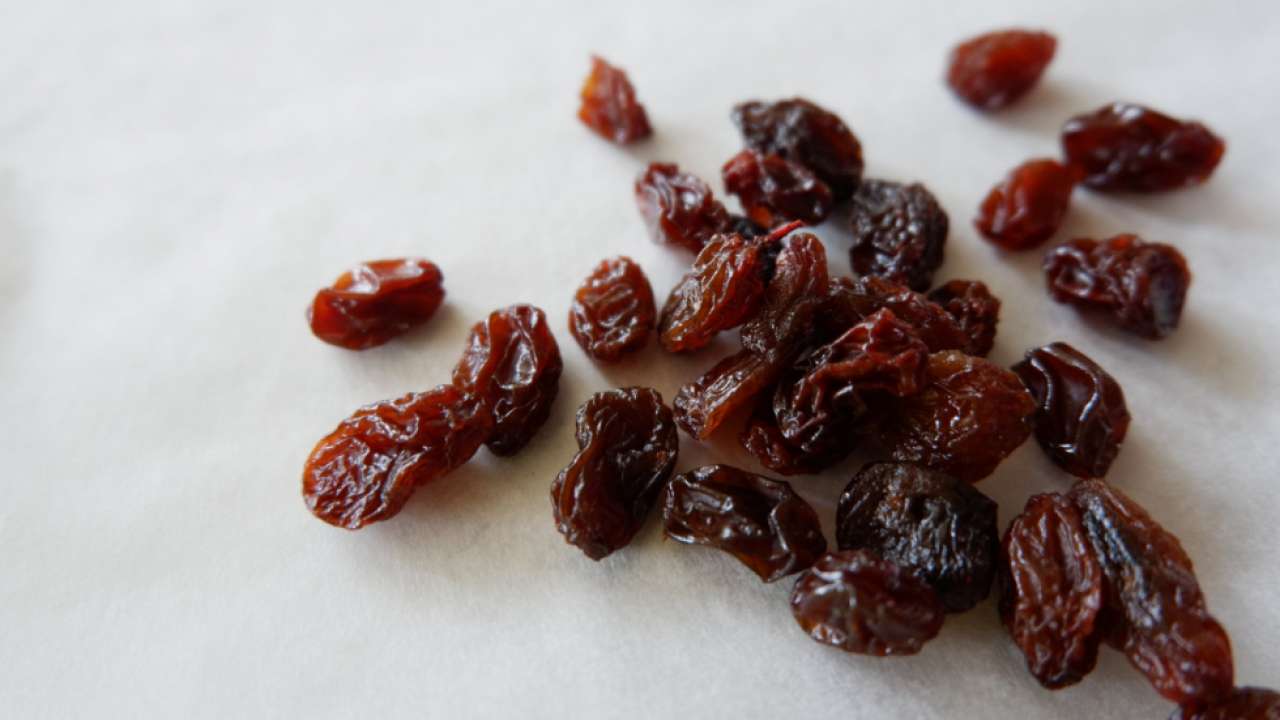
- Heart Health: Raisins are low in saturated fat and cholesterol while being rich in potassium, which helps lower blood pressure levels. Their antioxidant properties also contribute to heart health by reducing oxidative stress and inflammation.

- Weight Management: Despite being calorie-dense, raisins can be included in a weight management plan due to their high fiber content, which promotes feelings of fullness and helps control appetite.

- Anemia Prevention: Raisins contain iron, which is crucial for the production of red blood cells and the prevention of iron deficiency anemia.
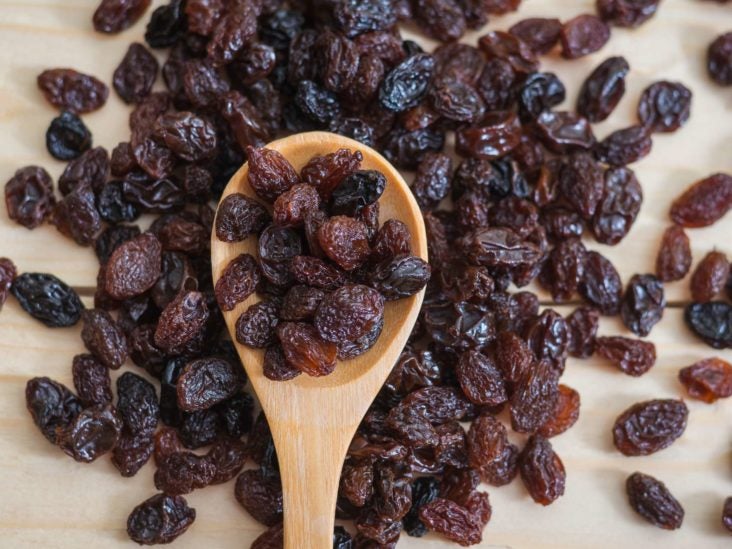
- Eye Health: The antioxidants present in raisins, such as vitamin C, carotenoids, and polyphenols, help protect against age-related macular degeneration and maintain good vision.

- Varieties of Raisins:
- Black Raisins: Black raisins are made from drying dark-colored grape varieties. They have a slightly tart and sweet flavor profile and are known for their high antioxidant content.
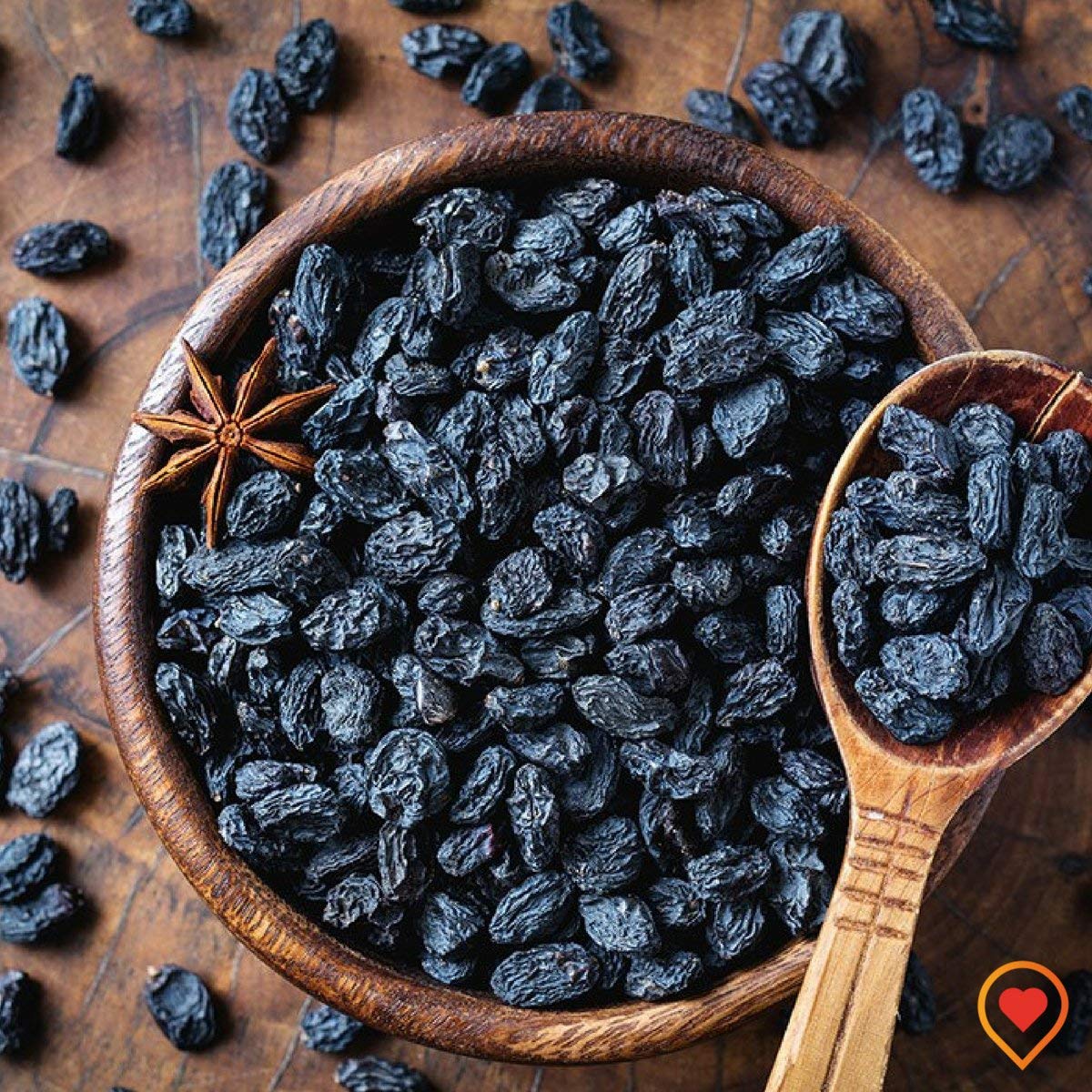
- Golden Raisins: Golden raisins, also known as sultanas, are made from yellow or green grape varieties. They have a milder and sweeter taste compared to black raisins.

- Soaked Raisins: Soaking raisins in water overnight enhances their nutritional value and makes them softer and easier to digest. The water used for soaking can also be consumed for additional health benefits.
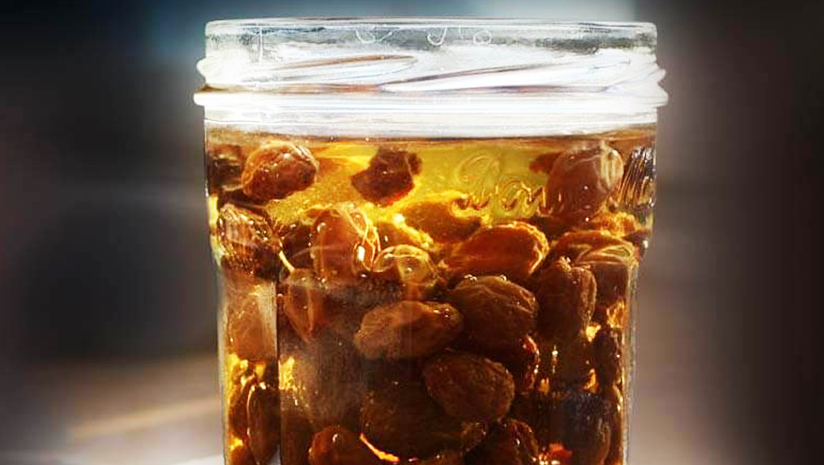
- Organic Raisins: Organic raisins are made from grapes that have been grown without the use of synthetic pesticides or fertilizers, making them a popular choice for those seeking natural and chemical-free options.

- Culinary Uses: Raisins are incredibly versatile and can be enjoyed in numerous ways:
- Snacking: Raisins can be eaten on their own as a healthy and convenient snack.

- Baking: They are commonly used in baked goods like cookies, cakes, muffins, and bread, adding sweetness and texture to the final product.

- Cooking: Raisins are a popular ingredient in both savory and sweet dishes. They can be added to pilafs, rice dishes, salads, stews, and tagines, lending a touch of natural sweetness and complexity to the flavors.
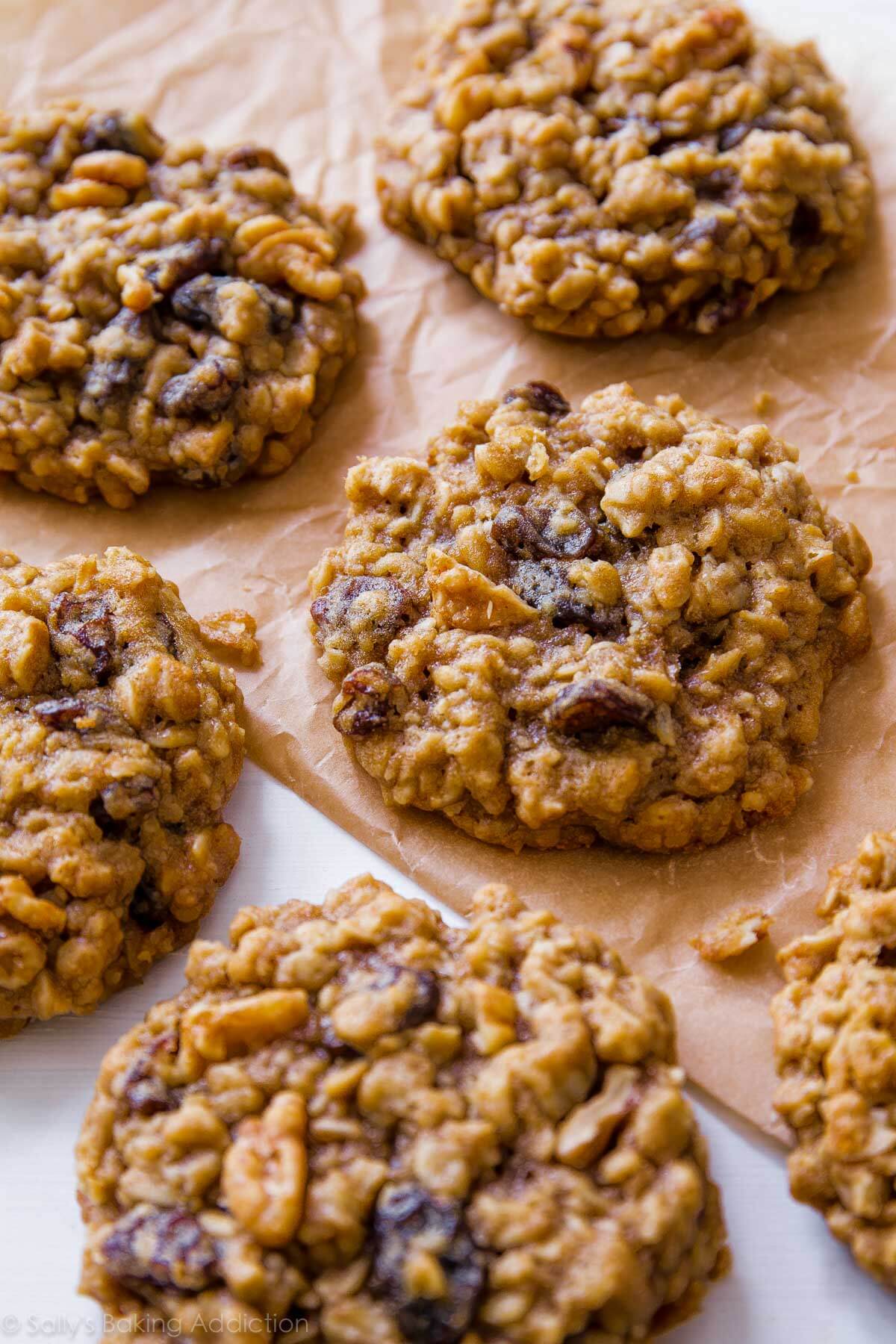
- Trail Mixes: Raisins are often included in trail mixes along with nuts, seeds, and other dried fruits for a nutritious and energy-boosting snack.
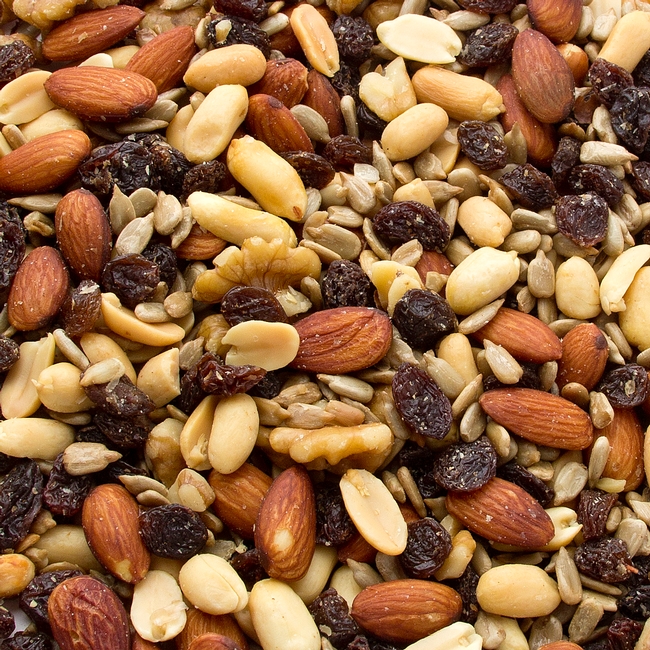
raisins are a nutritious and flavorful dried fruit with a wide range of health benefits. Whether enjoyed as a standalone snack or used in various culinary creations, they offer a convenient and delicious way to incorporate essential nutrients into your diet. So next time you’re looking for a wholesome and satisfying snack, reach for a handful of raisins and reap the benefits of this versatile fruit.
Raisins in Different Languages:
Raisins are known by various names in different Indian languages. Here are the names of raisins in some commonly spoken languages in India:
- Hindi: Kishmish (किशमिश)
- Bengali: Kismis (কিসমিস)
- Tamil: Unakka munthiri (உனக்க முந்திரி)
- Telugu: Endu Draksha (ఎండు ద్రాక్ష)
- Kannada: Ona Drakshi (ಒಣ ದ್ರಾಕ್ಷಿ)
- Malayalam: Unakka munthiri (ഉണക്ക മുന്തിരി)
- Gujarati: Manukka (મનુક્કા)
- Marathi: Manuka (मनुका)
- Punjabi: Kishmish (ਕਿਸਮਿਸ)
- Urdu: Kishmish (کشمش)
Dried Raisins:
- Dried raisins are dehydrated grapes, resulting in a shriveled and chewy fruit.
- Raisins are made from grape varieties like Thompson Seedless, Sultana, or Black Corinth.
- The drying process involves carefully harvesting ripe grapes and drying them under controlled conditions.
- Grapes are laid out on drying trays or racks and exposed to the sun or placed in dehydrators.
- As the grapes dry, their water content evaporates, leaving behind concentrated flavors and nutrients.
- The natural sugars in the grapes become more concentrated during drying, resulting in a sweet taste.
- Raisins undergo chemical changes during drying, giving them their distinct flavor profile.
- Dried raisins retain the nutritional value of the grapes, making them a nutrient-dense snack.
- Raisins are rich in dietary fiber, vitamins, minerals, and antioxidants.
- They provide essential nutrients like potassium, iron, calcium, magnesium, and B-complex vitamins.
- Raisins are a good source of natural sugars, offering a quick energy boost.
- Dried raisins have a long shelf life due to the removal of moisture, preventing spoilage.
- They are a convenient and portable snack option.
- Dried raisins are versatile and can be enjoyed as a standalone snack or used in various dishes.
- They add sweetness and texture to baked goods, including cakes, cookies, bread, and muffins.
- Raisins are commonly used in trail mixes, granola bars, and cereals.
- They can be incorporated into rice dishes, pilafs, stuffing, and salads for a unique flavor contrast.
- Dried raisins are a popular choice due to their versatility, nutritional benefits, and delightful taste.
- They are a convenient and healthy addition to a well-balanced diet, whether consumed as a snack or used in cooking and baking.
MUNAKKA(Indian raisins):

- Munakka is a specific type of dried grape variety commonly found in India, also known as Indian raisins.
- It is made by drying large, seedless grapes, typically of the Thompson Seedless variety.
- The grapes used for making munakka are sourced from vineyards in different parts of India.
- The process involves removing the stems from the grapes and allowing them to dry naturally in the sun or using specialized dehydrators.
- As the grapes dry, their moisture content decreases, resulting in dark-colored, wrinkled fruit known as munakka.
- Munakka differs from regular raisins in terms of size and texture, being larger and plumper.
- The dark brown to black color of munakka is due to natural oxidation during the drying process.
- Munakka is consumed as a standalone snack or used in various culinary preparations.
- It has a sweet and slightly tangy flavor that adds a unique taste to dishes.
- Munakka is often used in Ayurvedic and traditional Indian medicine for its potential health benefits.
- It is believed to have therapeutic properties and is considered a natural remedy for various ailments.
- Munakka is rich in dietary fiber, natural sugars, vitamins, and minerals.
- It is particularly known for its high iron content, making it beneficial for individuals with iron-deficiency anemia.
- Munakka is appreciated for its taste, texture, and potential health benefits in Indian cuisine.
- It can be enjoyed as a snack, added to recipes, or used in traditional medicine practices.
Here are some Munakka Benefits:
- Rich source of antioxidants: Munakka is packed with antioxidants that help protect the body against free radicals and oxidative stress.
- Supports digestive health: Munakka is known to have natural laxative properties that aid in promoting regular bowel movements and relieving constipation.
- Boosts energy levels: Being rich in natural sugars, Munakka provides a quick energy boost, making it a great snack for combating fatigue and tiredness.
- Supports cardiovascular health: Munakka contains dietary fiber and heart-healthy compounds that help maintain optimal heart health and regulate cholesterol levels.
- Enhances iron levels: Munakka is a good source of iron, which is essential for the production of red blood cells and prevention of iron-deficiency anemia.
- Supports respiratory health: Munakka is believed to have respiratory benefits and is commonly used in traditional remedies for conditions like asthma and bronchitis.
- Improves bone health: Munakka contains essential minerals like calcium and magnesium, which are vital for maintaining strong and healthy bones.
- Helps regulate blood pressure: Munakka contains potassium, a mineral known for its role in regulating blood pressure levels.
- Boosts immunity: The antioxidants and various nutrients in Munakka help strengthen the immune system and protect against infections and diseases.
- Supports brain health: Munakka contains natural compounds that are believed to have neuroprotective properties, benefiting brain health and cognitive function.
It’s important to note that while Munakka has potential health benefits, it should be consumed in moderation as part of a balanced diet. As with any dietary changes or specific health concerns, it’s advisable to consult with a healthcare professional for personalized advice.
Disadvantages of Munakka(Black Dried Raisins)/(Indian Raisins)
While Munakka (Indian raisins) offers several health benefits, it’s important to be aware of some potential disadvantages as well:
- High Sugar Content: Munakka, like other dried fruits, contains concentrated natural sugars. While these sugars can provide a quick energy boost, excessive consumption may contribute to weight gain and increased blood sugar levels. It is advisable to consume Munakka in moderation, especially for individuals with diabetes or those following a low-sugar diet.
- Caloric Density: Munakka is a calorie-dense food due to the removal of water during the drying process. This means that consuming large quantities of Munakka can contribute to an increased calorie intake, which may not be suitable for individuals aiming to lose weight or maintain a calorie-controlled diet.
- Sulfites: Some commercially processed Munakka may contain sulfites, which are added as preservatives to enhance shelf life and maintain color. Sulfites can trigger allergic reactions in sensitive individuals, including respiratory problems, skin rashes, and digestive issues. It is important to check the label or opt for organic varieties if you have sulfite allergies or sensitivities.
- Potential for Tooth Decay: Like other dried fruits, Munakka can be sticky and cling to teeth, increasing the risk of tooth decay. It is advisable to rinse the mouth with water or brush the teeth after consuming Munakka to minimize the potential negative effects on dental health.
- Contamination Risks: As with any dried fruit, there is a small risk of contamination, including mold growth, insects, or pesticide residues. It is recommended to purchase Munakka from reputable sources and store it properly in a cool, dry place to minimize the risk of contamination.
It’s important to note that the disadvantages mentioned above are based on potential risks associated with excessive consumption or individual sensitivities. As with any food, moderation and individual considerations are key to enjoying the benefits of Munakka while minimizing any potential drawbacks.
Raisin Fruit:
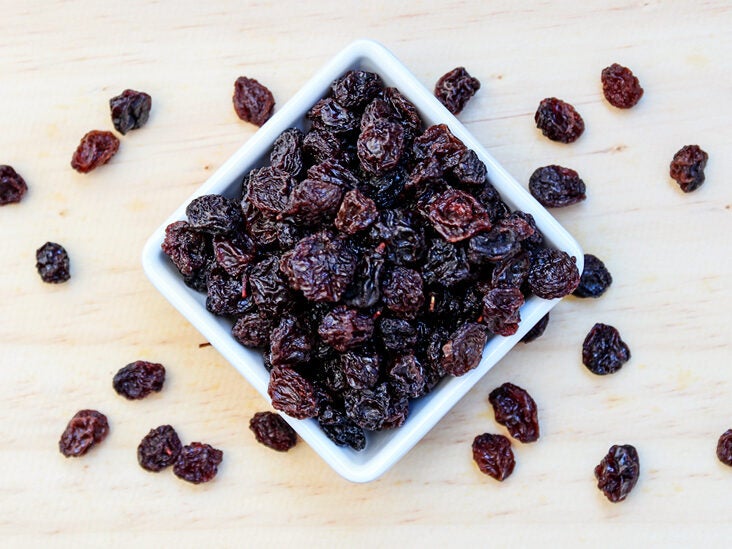
- Raisin fruit refers to dried grapes with reduced moisture content.
- Raisins can be made from various grape varieties like Thompson Seedless, Sultana, and Black Corinth.
- Grapes are harvested and dried through exposure to the sun or using dehydrators.
- The drying process concentrates the natural sugars in grapes, resulting in a sweet taste.
- Raisins offer nutritional benefits such as dietary fiber, vitamins, and minerals.
- They are a source of natural sugars, providing quick energy.
- Raisins are versatile and widely used in cooking, baking, and snacking.
- They add sweetness and texture to baked goods like cakes, cookies, and muffins.
- Raisins are used in savory dishes like rice dishes, salads, and tagines for a touch of sweetness.
- They can be enjoyed as a standalone snack or mixed with other dried fruits and nuts.
- Raisins are convenient, portable, and make a great addition to breakfast cereals and yogurt bowls.
- Consuming raisins contributes to a balanced and flavorful diet.
FAQ’s
- Q: What are raisins good for?
A: Raisins are good for providing dietary fiber, natural sugars, vitamins, and minerals. They offer quick energy and aid in digestion. - Q: Is raisins and kismis the same?
A: Yes, raisins and kismis are different terms used interchangeably to refer to dried grapes. - Q: Which raisin is good for the skin?
A: Black raisins are often considered beneficial for the skin due to their antioxidant content, which helps promote healthy skin. - Q: Is it good to drink soaked raisins water every day?
A: Drinking soaked raisins water may provide some health benefits as it contains nutrients from the raisins. However, it is important to consume in moderation. - Q: Can I eat 10 raisins every day?
A: Yes, consuming 10 raisins per day is generally considered a reasonable portion size. - Q: How many raisins per day?
A: The recommended daily intake of raisins varies but consuming a handful (around 30 grams) is a common guideline. - Q: Which dry fruit is best?
A: Different dry fruits offer various health benefits. Almonds, walnuts, and pistachios are often considered among the best options due to their nutritional profile. - Q: Which raisin is best, black or yellow?
A: Both black and yellow raisins offer nutritional benefits. The choice depends on personal preference and the specific health benefits one seeks. - Q: Which raisin is best for hemoglobin?
A: Black raisins are often recommended for their iron content, which can help improve hemoglobin levels. - Q: Can we drink raisin-soaked water?
A: Yes, raisin-soaked water can be consumed. It may contain some nutrients from the raisins, but it is important to consume it in moderation. - Q: How many raisins should be soaked in water?
A: There is no specific quantity, but soaking around 10-15 raisins in a glass of water overnight is a common practice. - Q: How many raisins are too many?
A: Consuming excessive amounts of raisins can contribute to high sugar intake and calories. It’s best to consume them in moderation. - Q: What is the best time to eat raisins?
A: Raisins can be enjoyed at any time of the day. Some people prefer to consume them in the morning or as a midday snack. - Q: What is the best age for raisins?
A: Raisins can be introduced as a part of a balanced diet when a child is ready for solid foods, usually around 6 months of age. - Q: How many almonds should be consumed per day?
A: The recommended daily intake of almonds is around 1 ounce or roughly 23 almonds. - Q: Are black raisins considered hot or cold?
A: In Ayurveda, black raisins are considered “hot” in nature, meaning they have a warming effect on the body. - Q: Can I eat raisins with milk?
A: Yes, raisins can be added to milk or consumed together. They can enhance the flavor and nutritional content of the milk. - Q: Should I eat raisins at night?
A: Eating raisins at night is generally fine. However, if you have specific dietary restrictions or concerns, it’s best to consult with a healthcare professional.




